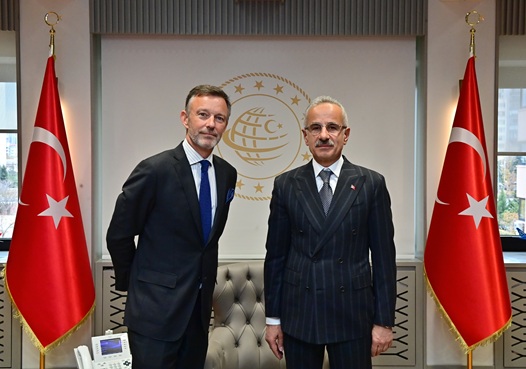ACI EUROPE addresses key challenges for aviation in Türkiye

Ankara, 21 November 2024: ACI EUROPE today engaged with the government of Türkiye to review and address the challenges faced by the country in sustainably developing air connectivity to further contribute to its economy and global positioning.
Meeting with his Excellency Mr Abdulkadir Uraloğlu, Minister for Transport and Infrastructure, the Director General of ACI EUROPE, Olivier Jankovec pointed to the impressive expansion of Turkish aviation over the past years. Accordingly, total air connectivity in Türkiye has reached record levels, having expanded by +24% when compared to pre‑pandemic (2019) levels — far outperforming the European average, which still needs to recover (‑14%). In this regard, the performance of iGA Istanbul Airport is clearly standing out, with the Turkish hub now ranking number 1 in Europe for direct air connectivity, up from the 5th position back in 2019.
Jankovec stressed how these developments are significantly contributing to the Turkish economy, considering that every +10% increase in air connectivity yields +0.5% gain in GDP per capita along with a +1.6% increase in jobs. In effect, the Turkish airports and the connectivity they enable contribute €47.2 billion to the country’s GDP and support close to 500,000 jobs.
However, Jankovec also raised a number of issues that need to be addressed to safeguard and reinforce aviation’s role as a critical engine of economic and social development in Türkiye — in particular when it comes to the vital tourism sector.
Chief amongst these issues is allowing more airlines to fly into Türkiye: “Airports around the world are focused on diversifying their airline portfolios to maximise their potential in terms of route development and connectivity. However, this requires more liberal approaches from Governments regarding traffic rights for all airlines, which regulate the extent to which they can access airports and plan their networks. In this context, it would be helpful if the Turkish government could reconsider its position on this matter, moving away from protectionist policies and instead adopting open skies principles. Failing to do so will only hinder wider economic benefits, to the disadvantage of the Turkish people”.
Other issues raised by Jankovec included:
- The need for Türkiye to ensure a more dynamic and market‑related regulation of airport charges, so as to allow its airports to reflect inflationary pressures in their user charges as well as the costs incurred by planned investments.
- Better integration between Air Traffic Management and ground operations at airports.
This is especially important in the context of iGA Istanbul Airport’s three parallel runway operational concept, which is set to maximise airport capacity and thus connectivity — along with gains in environmental efficiency.
- The urgency of enacting a supportive policy and regulatory framework for the supply and uptake of Sustainable Aviation Fuels (SAF).
Turkish airports are fully committed to Net Zero by 2050 for those emissions under their control — scopes 1 & 2, with 43 airports operated by DHMI and the other airports operated by concessionaires working hard to reduce their CO2 emissions under the Airport Carbon Accreditation programme.
But the next frontier in climate action for airports is about reducing their scope 3 emissions — amongst other, including those coming from aircraft operated by airlines. In this regard, it is crucial that Türkiye moves ahead and enacts its own SAF mandates, following the in‑depth consultation process that has taken place over the past 2 years. With SAF being the key enabler of aviation decarbonisation, there is no doubt that Türkiye’s continued leading position on global aviation will be predicated on its ability to develop its own SAF supply chain. Apart from mandates, this should also involve effective supportive measures to ensure their affordability.

